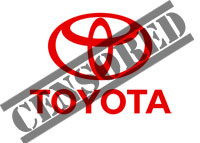- You are here:
- Home »
- Toyota Litigation »
- Judge to parties in Toyota securities suit: “resolve the fight over discovery on your own … and you’ve got 1 week”
Judge to parties in Toyota securities suit: “resolve the fight over discovery on your own … and you’ve got 1 week”
7 May 2010 — A federal judge in Los Angeles has declined a request by plaintiffs lawyers in a shareholder class action to force attorneys for Toyota Motor Corp. to turn over documents that were provided to Congress, which has been investigating vehicle recalls associated with sudden unintended acceleration defects.
Instead, U.S. District Judge Dale Fischer of the Central District of California on Monday ordered the parties to reach a discovery agreement on their own within a week.
The suit, filed on Feb. 8, is the first shareholder class action to allege that Toyota’s executives and directors made false and misleading statements to shareholders regarding the defects. For the full article from the National Law Journal click here.
Lawyers for the plaintiff had asked Fischer to lift a stay on discovery and instead order that documents relevant to the case be preserved or turned over. Under securities law, discovery is stayed in a shareholder case if a judge has yet to rule on pleading motions, such as a motion to dismiss.
The plaintiff lawyers pointed to “serious allegations” that Toyota failed to disclose the defects such as the fine imposed by the National Highway Traffic Safety Administration (see our previous post by clicking here).
And they brought up claims in a wrongful termination suit brought by a former in-house attorney at Toyota, Dimitrios Biller, that Toyota destroyed or hid evidence in hundreds of products liability suits, plus the issue of the documents produced to Congress (see our intro piece on the Toyota litigation by clicking here).
This is a situation The Sedona Conference has focused much of its efforts on: calling on lawyers to work more collaboratively during the discovery phase so that greater time and attention (and money) can be spent on litigating the merits of the underlying dispute. But its success was premised on getting the judiciary to support its ideals. As we have reported in numerous posts from numerous conferences, judges used to rarely be involved in discovery, but with recent amendments to the Federal Rules of Civil Procedure regarding e-discovery, judges now play a central role. It is an issue that Ralph Losey has written about in numerous posts. For a sample of his commentary click here.
And while skeptics argue that the adversarial nature of litigation will likely always encourage scorched-earth discovery battles, it is more than judges telling lawyers to “play nice”. As Jason R. Baron, director of litigation for the U.S. National Archives and Records Administration, once told us and has written about: “It’s not about helping the other side; that’s crazy. It’s about fighting over the substantive matters of law, and not spending all of the client’s money on discovery.”
For all of our Toyota litigation coverage click here.

